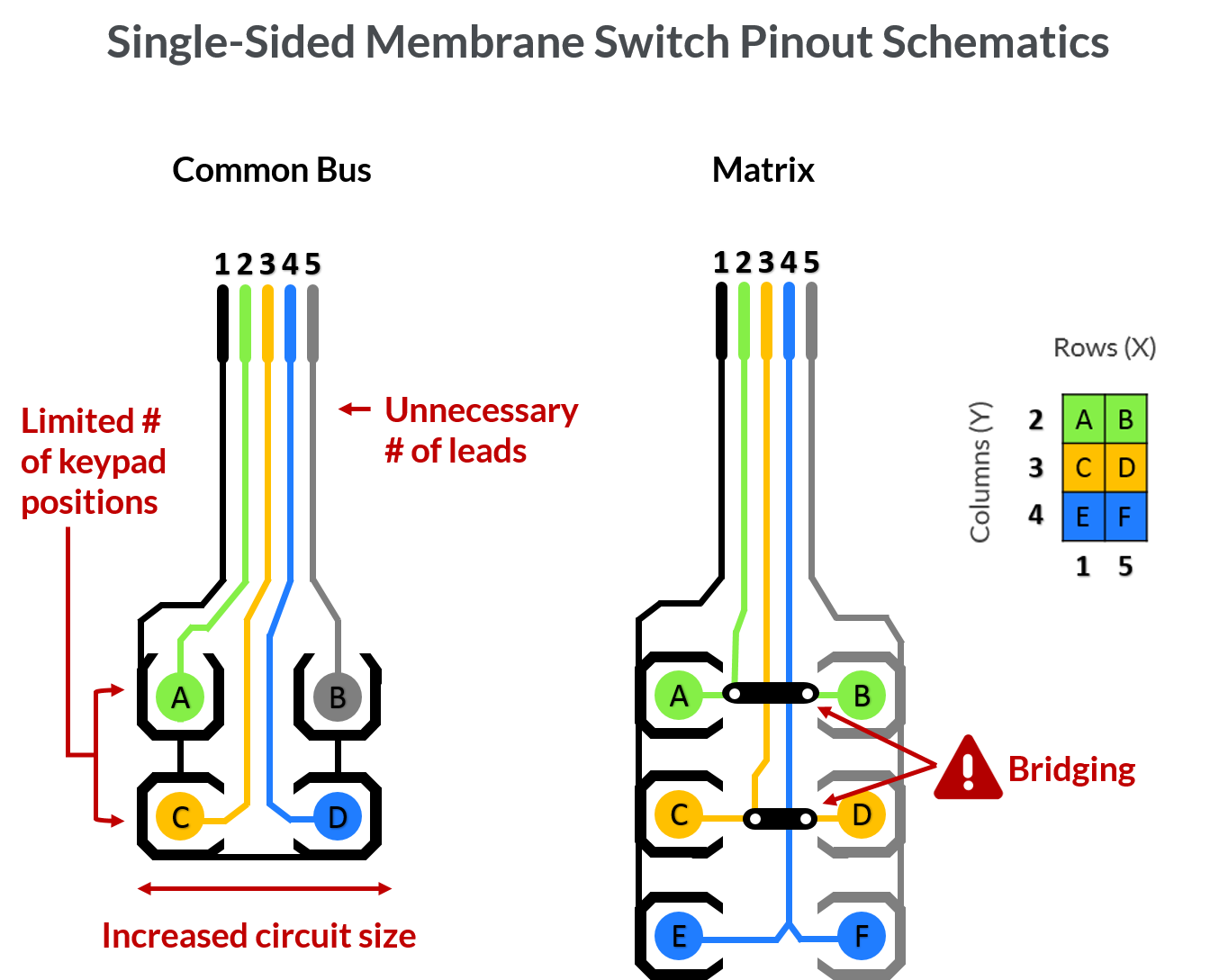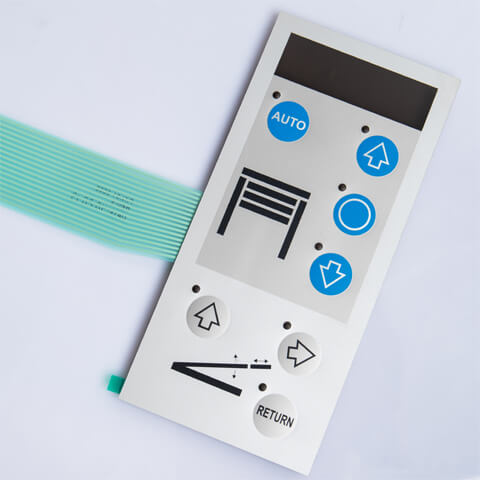Understanding the Relevance of Membrane Switch in Modern Electronics and Their Applications
Membrane switches over act as an essential component in contemporary electronics, providing an efficient interface for customer interaction. Their customizable and lightweight nature makes them ideal for a range of applications throughout varied markets. Comprehending their vital components and advantages can give insights into their growing importance. As technology remains to breakthrough, the evolution of Membrane changes questions about their future applications and style innovations. What lies ahead in this vibrant area?

What Are Membrane Switches?
Membrane switches are necessary elements in modern electronic devices, acting as user interfaces that facilitate communication between individuals and gadgets. These switches are composed of several layers, consisting of a graphic overlay, a glue layer, and a circuit layer, every one of which work together to produce a practical and long lasting interface. The design permits a flat, low-profile solution that can be customized relating to size, shape, and visual appearance, making them suitable for different applications, from customer electronic devices to clinical gadgets. The responsive responses supplied by Membrane switches boosts individual experience, while their resistance to dirt and wetness makes them optimal for challenging atmospheres. Membrane buttons can integrate functions such as backlighting and published graphics, better expanding their functionality. Their versatility and robustness make them a recommended option in industries where integrity and simplicity of use are critical, inevitably contributing to the seamless procedure of modern-day electronic gadgets.
Key Components of Membrane Switches
While different elements add to the functionality of a membrane button, 3 primary layers play considerable duties in its design and operation. The top layer, generally made from a resilient polymer, works as the interface for individual interaction, frequently featuring published graphics and symbols. Beneath this is the spacer layer, which preserves the needed range between the top layer and the circuit layer. This spacer layer assurances that the button activates only when pushed, preventing accidental inputs. The circuit layer consists of conductive traces that complete the electrical circuit when the leading layer is dispirited. These traces can be made from various materials, consisting of copper or silver. Together, these elements develop a dependable and durable gadget that is compact and versatile, appropriate for a large range of digital applications, from household home appliances to medical tools. Comprehending these vital components is vital for valuing the total performance of Membrane switches.
Advantages of Utilizing Membrane Switches

Membrane Switch Manufacturing Refine
Understanding the Membrane switch manufacturing process discloses the elaborate actions entailed in creating these essential parts. The process normally starts with the design stage, where formats and specs are produced utilizing specialized software program. Following this, the graphic overlay is published on a versatile substrate, usually making use of high-resolution printing strategies to ensure quality and precision.Next, the sticky layers are used, which serve to bond the various parts with each other. The circuit layers, made from conductive inks or materials, are after that printed onto a separate substrate. These layers are carefully lined up and laminated flooring to produce a practical switch.After setting up, the switches undergo evaluating to verify capability and resilience. Quality control actions are executed throughout the procedure to identify and rectify any defects. The completed Membrane buttons are packaged and prepared for distribution, all set to meet the needs of contemporary digital applications.
Applications of Membrane Switches Over in Different Industries
Membrane switches are progressively made use of throughout numerous industries, particularly in medical equipment and customer electronic devices. In the clinical area, they provide trusted control interfaces for tools that need accurate procedure. In consumer electronics, these switches boost individual interaction by offering smooth and responsive interfaces. Receptive Medical Tools Control
Countless modern clinical devices make use of Membrane switches for streamlined operation and boosted user interaction. These buttons provide a trustworthy, sturdy interface for a range of applications, including diagnostic equipment, individual surveillance systems, and surgical tools. Their customizable layouts enable details designs that can fit the distinct needs of healthcare specialists, making certain intuitive navigating and effective access to necessary features. Furthermore, Membrane switches are resistant to impurities, making them suitable for sterilized settings. The responsive feedback they offer can enhance individual self-confidence, reducing the threat of mistakes during important clinical treatments. Generally, the assimilation of Membrane switches in medical devices considerably adds to enhanced operational efficiency and person security in health care setups.
Consumer Electronics Interfaces
In the domain name of consumer electronics, Membrane switches play a critical duty in boosting individual interfaces throughout a wide variety of gadgets. These buttons are essential to items such as remotes, microwaves, and gaming consoles, offering a user-friendly and reliable user interface. Their design allows for a smooth integration of graphics and functionality, making it possible for producers to create streamlined, modern-day aesthetics without jeopardizing use. Membrane buttons are also understood for their toughness, often standing up to considerable usage and exposure to numerous environmental problems. In addition, they can include features like backlighting and tactile feedback, additional boosting the customer experience. As customer demands for sophisticated yet instinctive interfaces grow, Membrane switches over proceed to be a crucial part in progressing electronic tool functionality.
Design Considerations for Membrane Changes
Designing reliable Membrane switches over requires mindful interest to various factors that affect both capability and individual experience. One important factor to consider is the selection of materials, as they can affect resilience, responsive feedback, find more info and visual charm. Choosing a suitable adhesive is crucial for guaranteeing long-lasting attachment and resistance to environmental factors.In addition, the design and style of the switch need to accommodate customer communication, with button sizes and spacing optimized for convenience of use. The incorporation of graphics and labeling ought to prioritize quality and visibility under various lights conditions.Consideration of electric qualities, such as actuation force and button level of sensitivity, will certainly improve the responsiveness of the Membrane switch. Furthermore, the design must fit making procedures to ensure cost-effectiveness and prompt production. On the whole, a well-balanced design improves both the capability and the customer experience of Membrane buttons in modern-day electronics.

Future Trends in Membrane Switch Innovation
As modern technology remains to progress, Membrane buttons are positioned to integrate brand-new advancements that will certainly boost their capability and application in different areas. One considerable fad is the consolidation of adaptable and resilient products, which will raise the lifespan and reliability of these buttons. Enhanced surface area structures and adjustable graphics view website are likewise prepared for, enabling more instinctive user interfaces.Moreover, the integration of wise technology, such as touch-sensitive surface areas and haptic comments, is expected to improve individual communication, making Membrane switches a lot more appealing and responsive. Furthermore, advancements in published electronic devices will certainly make it possible for more complicated wiring within thinner accounts, additionally increasing design possibilities.Sustainability will certainly additionally play an essential role in future advancements, as makers explore environment-friendly materials and manufacturing procedures. Generally, these trends will assure that Membrane switches over continue to be appropriate and indispensable in a significantly electronic and interconnected world.
Frequently Asked Inquiries
Exactly How Do Membrane Changes Compare to Conventional Mechanical Buttons?
Membrane switches offer advantages over traditional mechanical buttons, including decreased size, lighter weight, and improved sturdiness. They commonly supply a sealed surface, improving resistance to dust and moisture, making them suitable for varied applications.
What Products Are Commonly Made Use Of in Membrane Switch Building?

Can Membrane Switches Over Withstand Extreme Environmental Issues?
Membrane buttons can endure extreme environmental conditions, relying on their layout and products. Top notch constructions commonly include resilience versus temperature fluctuations, moisture, and exposure to chemicals, making them appropriate for different requiring applications throughout markets.
Just How Long Do Membrane Changes Usually Last Prior To Failing?
Membrane switches normally show a life-span ranging from 1 to 10 million actuations, relying on aspects such as usage regularity, environmental problems, and manufacturing high quality. Routine maintenance can extend their durability and operational dependability substantially.
Are Membrane Switches Adjustable for Specific Applications?
Membrane buttons are without a doubt customizable for particular applications. They can be customized in dimension, performance, and layout, allowing producers to meet special individual demands and boost product aesthetic appeals while preserving operational performance and resilience. Membrane switches are necessary elements in modern-day electronics, serving as individual interfaces that help with interaction between individuals and devices. The responsive comments given by Membrane switches enhances individual experience, while their resistance to dust and moisture makes them ideal for testing settings. The consolidation of graphics and labeling need to focus on clearness and exposure under numerous lights conditions.Consideration of electrical qualities, such as actuation force and button level of sensitivity, will improve the responsiveness of the Membrane switch. Boosted surface appearances and personalized graphics are likewise prepared for, allowing for even more intuitive customer interfaces.Moreover, the integration of smart modern technology, such as touch-sensitive surface areas and haptic feedback, is anticipated to enhance individual interaction, making Membrane switches extra interesting and responsive. Membrane switches over deal advantages over traditional mechanical buttons, consisting of lowered size, lighter weight, and enhanced resilience.
Comments on “Membrane Switch Manufacturer Serving Medical and Military Industries”